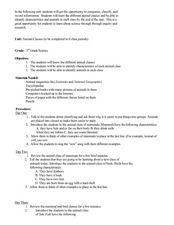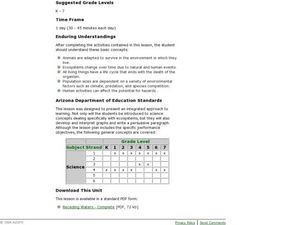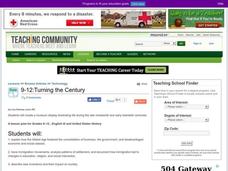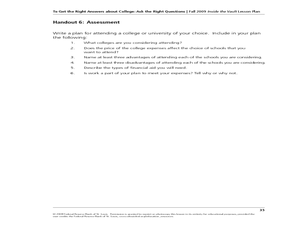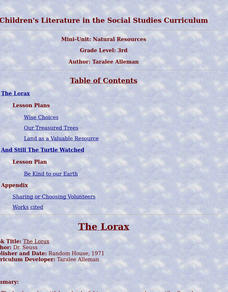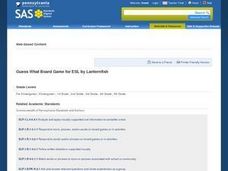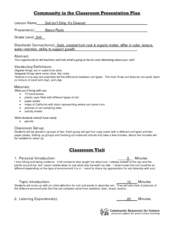Curated OER
Plastics by the Numbers
Students investigate plastic resins and their uses. In this plastics lesson plan, students describe major plastic resins and what they are used for, they compare and contrast the properties of plastic resins and they list products that...
Curated OER
Sorting and Using Materials
Learners explore materials and their properties. In this matter lesson, students identify objects and describe their properties. Learners test and sort materials using an interactive whiteboard, followed by a group discussion of what was...
Curated OER
Your Land, My Land, Woody's Land Too
Students become familiar with the song writer Woody Guthrie and his song, This Land Is Your Land. In this getting to know our land lesson, students understand the vocabulary of the song and some biographical information about Woody...
Curated OER
Makes Cents to Me: Penny Drive
St that people have wants and must find ways to get them. In this philanthropy lesson, students understand the ways people get things and arrange a penny drive to help others. Students arrange an artistic project to reflect on their fund...
Curated OER
Oh Deer! and English Learner Writing Extensions
Students follow deer through Yellowstone Park and record the number of deer from year to year. In this basic needs of deer lesson, students work in small groups and chart the number of deer each year and give explanations using as...
Curated OER
How Fast Are You?
Students explore constructive ways of handling conflict. In this conflict resolution lesson plan, students brainstorm things that make them angry, sad, happy, etc. Students listen to a story and identify ways the characters handled...
Curated OER
Animal Classes
Third graders research animals through books and magazines and put them into their various classes. In this animal classes lesson plan, 3rd graders describe the characteristics of animals in each class.
Curated OER
Receding Waters
Students explore the effect of environmental factors on ecosystems. In this wildlife and ecology lesson, students identify and describe the stages in a frog's life cycle. Students participate in a simulation demonstrating the...
Curated OER
Literacy Through Photography
Students practice using words to describe photographs they have taken. In this descriptive writing lesson, students utilize a disposable or digital camera to take 5 pictures of their life after school. Students create slides...
Curated OER
Animal Habitats
Students research an animal and their habitat. In this animal habitat lesson, students observe a WebQuest that describes the different habitats: deserts, tundra, rainforest, forest, and ocean. They determine which habitat their animal...
Curated OER
Advanced Electromagnetism and Electromagnetic Induction
For this electromagnetism and electromagnetic induction worksheet, students answer 11 questions using calculus to determine things such as magnetic flux and wave output.
Curated OER
Diversity of Trees
Fourth graders explore the uses of trees, In this trees lesson, 4th graders discover the uses of trees and how we use them everyday. Students collect items and decide if they are made from trees, have a scavenger hunt for wood products...
Curated OER
Place and Character in Poetry
Learners examine how place in poetry helps give clues about character. In this poetry activity, students read a poem while focusing on the descriptions of the room that is being described and predict what type of person would live there....
Curated OER
Turning the Century
Students examine the Gilded Age. In this Gilded Age lesson, students create a museum of their own showing what life was like in the nineteenth and early twentieth centuries. Students investigate immigration, settlement and how these...
Curated OER
To Get the Right Answers about College: Ask the Right Questions
Students survey college students. In this instructional activity, students explore typical costs. They examine education loans. Students complete a FASFA form and write an essay describing plans for obtaining money for...
Curated OER
Land as a Valuable Resource
Students investigate why the soil is important to our lives. In this natural resources lesson, students have a farmer as a guest speaker. Students begin to understand how farmers use and protect our natural resource. Students write...
Curated OER
Survival Kit
Students discuss how a strong community can be helpful for survival during hard times. In this Survival Kit art activity, students create their own Survival Kit. Students use various items to symbolize things needed for survival in day...
Curated OER
Gone But Not Forgotten
Third graders examine animals and organisms that have become extinct and their similarities to living organisms. In this extinction lesson students divide into groups and research extinct animals.
Curated OER
Family Member
In this learning exercise on family members, learners describe what is meant by family, their duty to family, and family meetings. In addition, they create a budget for their family for one month keeping track of all expenses for 7 days....
Curated OER
Designing A Study
In this designing a study worksheet, students conduct a study on all types of fish that live in the Hudson River. They complete 8 various types of questions that include mostly short answer in response to their findings. Students also...
Curated OER
Body Nouns Vocabulary Exercise
In this recognizing body parts and their functions worksheet, students read statements and choose the noun answers that they describe or define and then translate them. Students answer 20 questions.
Curated OER
Guess What Board Game
Students play the game "Guess What" to review using a relative clause. In this ESL lesson, students listen to the teacher describe something using the relative clause and then guess what that thing is or the students must define...
Curated OER
Soil Isn't Dirty; It's Diverse!
Second graders participate in a soil activity. In this soil lesson plan students complete a worksheet describing different soil types and the organic and inorganic things found in them.
Curated OER
Getting to Know You
Students converse with each other while playing a game in order to discover things that are alike and things that are different about themselves. The students gather data about themselves, organize and display data on the graph, and...






